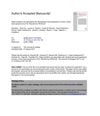 55 citations,
July 1999 in “Clinics in Sports Medicine”
55 citations,
July 1999 in “Clinics in Sports Medicine” Athletes use steroids to enhance performance despite health risks and legal issues, and education on their dangers is needed.
 54 citations,
October 2019 in “Cochrane library”
54 citations,
October 2019 in “Cochrane library” Some drugs may reduce prostatitis symptoms short-term with few side effects.
 54 citations,
May 2017 in “Biomedicine & Pharmacotherapy”
54 citations,
May 2017 in “Biomedicine & Pharmacotherapy” Edible seeds from the Cucurbitaceae family like pumpkin and watermelon seeds are nutritious and may have health benefits, but eating too much can cause side effects.
[object Object]  53 citations,
February 2020 in “Expert Opinion on Pharmacotherapy”
53 citations,
February 2020 in “Expert Opinion on Pharmacotherapy” Finasteride and minoxidil work best together for hair loss.
 49 citations,
October 2017 in “Nutrients”
49 citations,
October 2017 in “Nutrients” Equisetum debile extract, especially the ethyl acetate type, may be a promising natural ingredient for anti-hair loss products.
 49 citations,
April 2012 in “Phytotherapy Research”
49 citations,
April 2012 in “Phytotherapy Research” Rosemary leaf extract may be an effective natural treatment for hair growth and male pattern baldness.
 47 citations,
July 2014 in “European Journal of Pharmaceutics and Biopharmaceutics”
47 citations,
July 2014 in “European Journal of Pharmaceutics and Biopharmaceutics” Scientists created a gel with nanoparticles to deliver medicine to hair follicles effectively.
 45 citations,
August 2019 in “Dermatologic Therapy”
45 citations,
August 2019 in “Dermatologic Therapy” Hair loss treatments work better with lifestyle changes.
 41 citations,
July 2015 in “Current Drug Discovery Technologies”
41 citations,
July 2015 in “Current Drug Discovery Technologies” Some plants may help with hair growth and have fewer side effects than synthetic drugs, but more research is needed to confirm their effectiveness.
 41 citations,
December 2008 in “Current Opinion in Ophthalmology”
41 citations,
December 2008 in “Current Opinion in Ophthalmology” Certain eye surgery complications can be managed effectively, especially in patients who have used specific prostate medications.
 35 citations,
May 2020 in “Frontiers in Pharmacology”
35 citations,
May 2020 in “Frontiers in Pharmacology” Different drugs for prostate-related urinary symptoms work but have various side effects, and treatment should be tailored to the individual.
 33 citations,
May 2013 in “Andrologia”
33 citations,
May 2013 in “Andrologia” Some herbs show promise as antiandrogenic agents.
 31 citations,
May 2012 in “European Journal of Dermatology”
31 citations,
May 2012 in “European Journal of Dermatology” Menopause affects hair and skin; more research needed for treatment.
 30 citations,
January 2000 in “Dermatologic Clinics”
30 citations,
January 2000 in “Dermatologic Clinics” Finasteride and minoxidil are effective FDA-approved treatments for androgenetic alopecia.
 29 citations,
December 1998 in “Seminars in Cutaneous Medicine and Surgery”
29 citations,
December 1998 in “Seminars in Cutaneous Medicine and Surgery” New treatments for hair loss show promise, especially finasteride for men and a stronger minoxidil formula.
 25 citations,
July 2017 in “Archives of Dermatological Research”
25 citations,
July 2017 in “Archives of Dermatological Research” Herbal products might promote hair growth with fewer side effects, but more research is needed to confirm their safety and effectiveness.
 24 citations,
January 2020 in “International Journal of Molecular Sciences”
24 citations,
January 2020 in “International Journal of Molecular Sciences” Some plants with flavonoids may help treat hair loss and promote hair growth.
 24 citations,
January 2013 in “Indian Journal of Dermatology, Venereology and Leprology”
24 citations,
January 2013 in “Indian Journal of Dermatology, Venereology and Leprology” Hormonal treatment is effective for women with acne not helped by usual treatments, especially if they have hormonal imbalances.
 24 citations,
June 2011 in “Andrologia”
24 citations,
June 2011 in “Andrologia” Ganoderma lucidum may help treat enlarged prostate in rats.
 23 citations,
January 2013 in “Indian Journal of Dermatology, Venereology and Leprology”
23 citations,
January 2013 in “Indian Journal of Dermatology, Venereology and Leprology” FPHL causes hair loss in women due to genetics and hormones; minoxidil and anti-androgens are treatments, and early intervention is advised.
 23 citations,
July 1993 in “Pharmacotherapy”
23 citations,
July 1993 in “Pharmacotherapy” Finasteride treats enlarged prostate and baldness, but may cause limited urinary improvement and sex-related side effects.
 22 citations,
August 2017 in “Stem cells and cloning”
22 citations,
August 2017 in “Stem cells and cloning” Stem cell technologies and regenerative medicine, including platelet-rich plasma, show promise for hair restoration in treating hair loss, but more research is needed.
 21 citations,
June 2017 in “Journal of Dermatological Treatment”
21 citations,
June 2017 in “Journal of Dermatological Treatment” Topical cetirizine improves hair density and thickness in androgenetic alopecia, but more research is needed.
 21 citations,
May 2016 in “The Cochrane library”
21 citations,
May 2016 in “The Cochrane library” Topical minoxidil helps treat female pattern hair loss, but more research needed for other treatments.
 20 citations,
February 2009 in “Chemistry & Biodiversity”
20 citations,
February 2009 in “Chemistry & Biodiversity” Ganoderma lucidum may help treat prostate cancer by blocking male hormones and slowing cancer cell growth.
 19 citations,
August 2019 in “Expert Opinion on Therapeutic Targets”
19 citations,
August 2019 in “Expert Opinion on Therapeutic Targets” New treatments for hair loss may target specific pathways and generate new hair follicles.
[object Object]  19 citations,
September 2017 in “The Journal of urology/The journal of urology”
19 citations,
September 2017 in “The Journal of urology/The journal of urology” Poor sleep is linked to a higher risk of developing and worsening urinary problems in men.
 19 citations,
May 2014 in “Molecules”
19 citations,
May 2014 in “Molecules” Avicequinone C, a compound found in the Avicennia marina plant, can reduce hair loss by inhibiting a hormone linked to androgenic alopecia.
 16 citations,
September 2018 in “Journal of Ethnopharmacology”
16 citations,
September 2018 in “Journal of Ethnopharmacology” Plant-based remedies may treat hair loss by reducing inflammation and improving insulin resistance.
 15 citations,
June 2018 in “Food Reviews International”
15 citations,
June 2018 in “Food Reviews International” Pumpkin seed oil may improve prostate health, bladder control, and hair growth in men.






























